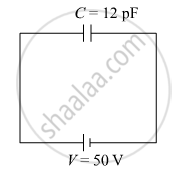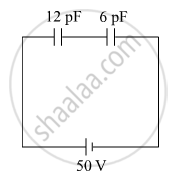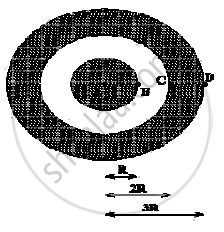Advertisements
Advertisements
प्रश्न
A 12 pF capacitor is connected to a 50 V battery. How much electrostatic energy is stored in the capacitor? If another capacitor of 6 pF is connected in series with it with the same battery connected across the combination, find the charge stored and potential difference across each capacitor.
उत्तर

`E=1/2CV^2`
`E=1/2×12×10^-12×(50)^2`
`E=1.5×10^-8 J`

`C_(eqv)=(C_1C_2)/(C_1+C_2)`
`=(12×6)/(12+6)`
`=72/18`
`=4×10^-12 F`
`Q=C_(eqv)V`
`=4×10^-12×50`
`=200×10^-12 C`
Charge stored in both capacitor is `200×10^-12 C`.
Voltage across 12 pF capacitor is `=Q/C= (200×10^-12)/(12×10^-12)=200/12=16.67 V`
Voltage across 12 pF capacitor is`=Q/C= (200×10^-12)/(6×10^-12)=200/6=33.33 V`
APPEARS IN
संबंधित प्रश्न
A spherical conducting shell of inner radius r1 and outer radius r2 has a charge Q.
(a) A charge q is placed at the centre of the shell. What is the surface charge density on the inner and outer surfaces of the shell?
(b) Is the electric field inside a cavity (with no charge) zero, even if the shell is not spherical, but has any irregular shape? Explain.
(a) Show that the normal component of electrostatic field has a discontinuity from one side of a charged surface to another given by
`(vec"E"_2 - vec"E"_1).hat"n" = sigma/in_0`
Where `hat"n"` is a unit vector normal to the surface at a point and σ is the surface charge density at that point. (The direction of `hat"n"` is from side 1 to side 2.) Hence show that just outside a conductor, the electric field is σ `hat"n"/in_0`
(b) Show that the tangential component of electrostatic field is continuous from one side of a charged surface to another.
[Hint: For (a), use Gauss’s law. For, (b) use the fact that work done by electrostatic field on a closed loop is zero.]
A 4 µF capacitor is charged by a 200 V supply. It is then disconnected from the supply and is connected to another uncharged 2 µF capacitors. How much electrostatic energy of the first capacitor is lost in the form of heat and electromagnetic radiation?
If Coulomb’s law involved 1/r3 dependence (instead of 1/r2), would Gauss’s law be still true?
The electrostatic force between the metal plates of an isolated parallel plate capacitor C having a charge Q and area A, is ______.
Which of the following statements is false for a perfect conductor?
A solid spherical conductor has charge +Q and radius R. It is surrounded by a solid spherical shell with charge -Q, inner radius 2R, and outer radius 3R. Which of the following statements is true?

Consider a finite insulated, uncharged conductor placed near a finite positively charged conductor. The uncharged body must have a potential:
